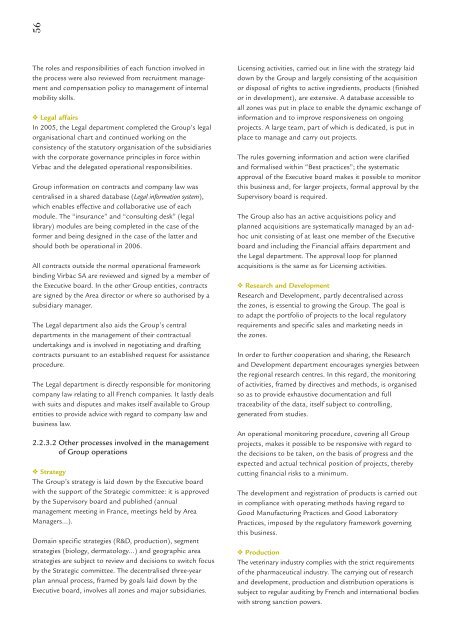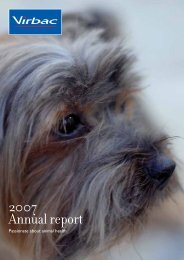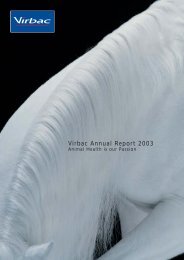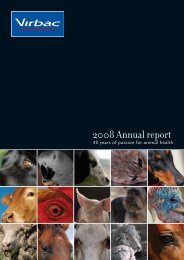2005 Annual report - Virbac
2005 Annual report - Virbac
2005 Annual report - Virbac
Create successful ePaper yourself
Turn your PDF publications into a flip-book with our unique Google optimized e-Paper software.
56<br />
The roles and responsibilities of each function involved in<br />
the process were also reviewed from recruitment management<br />
and compensation policy to management of internal<br />
mobility skills.<br />
❖ Legal affairs<br />
In <strong>2005</strong>, the Legal department completed the Group’s legal<br />
organisational chart and continued working on the<br />
consistency of the statutory organisation of the subsidiaries<br />
with the corporate governance principles in force within<br />
<strong>Virbac</strong> and the delegated operational responsibilities.<br />
Group information on contracts and company law was<br />
centralised in a shared database (Legal information system),<br />
which enables effective and collaborative use of each<br />
module. The “insurance” and “consulting desk” (legal<br />
library) modules are being completed in the case of the<br />
former and being designed in the case of the latter and<br />
should both be operational in 2006.<br />
All contracts outside the normal operational framework<br />
binding <strong>Virbac</strong> SA are reviewed and signed by a member of<br />
the Executive board. In the other Group entities, contracts<br />
are signed by the Area director or where so authorised by a<br />
subsidiary manager.<br />
The Legal department also aids the Group’s central<br />
departments in the management of their contractual<br />
undertakings and is involved in negotiating and drafting<br />
contracts pursuant to an established request for assistance<br />
procedure.<br />
The Legal department is directly responsible for monitoring<br />
company law relating to all French companies. It lastly deals<br />
with suits and disputes and makes itself available to Group<br />
entities to provide advice with regard to company law and<br />
business law.<br />
2.2.3.2 Other processes involved in the management<br />
of Group operations<br />
❖ Strategy<br />
The Group’s strategy is laid down by the Executive board<br />
with the support of the Strategic committee: it is approved<br />
by the Supervisory board and published (annual<br />
management meeting in France, meetings held by Area<br />
Managers…).<br />
Domain specific strategies (R&D, production), segment<br />
strategies (biology, dermatology...) and geographic area<br />
strategies are subject to review and decisions to switch focus<br />
by the Strategic committee. The decentralised three-year<br />
plan annual process, framed by goals laid down by the<br />
Executive board, involves all zones and major subsidiaries.<br />
Licensing activities, carried out in line with the strategy laid<br />
down by the Group and largely consisting of the acquisition<br />
or disposal of rights to active ingredients, products (finished<br />
or in development), are extensive. A database accessible to<br />
all zones was put in place to enable the dynamic exchange of<br />
information and to improve responsiveness on ongoing<br />
projects. A large team, part of which is dedicated, is put in<br />
place to manage and carry out projects.<br />
The rules governing information and action were clarified<br />
and formalised within “Best practices”; the systematic<br />
approval of the Executive board makes it possible to monitor<br />
this business and, for larger projects, formal approval by the<br />
Supervisory board is required.<br />
The Group also has an active acquisitions policy and<br />
planned acquisitions are systematically managed by an adhoc<br />
unit consisting of at least one member of the Executive<br />
board and including the Financial affairs department and<br />
the Legal department. The approval loop for planned<br />
acquisitions is the same as for Licensing activities.<br />
❖ Research and Development<br />
Research and Development, partly decentralised across<br />
the zones, is essential to growing the Group. The goal is<br />
to adapt the portfolio of projects to the local regulatory<br />
requirements and specific sales and marketing needs in<br />
the zones.<br />
In order to further cooperation and sharing, the Research<br />
and Development department encourages synergies between<br />
the regional research centres. In this regard, the monitoring<br />
of activities, framed by directives and methods, is organised<br />
so as to provide exhaustive documentation and full<br />
traceability of the data, itself subject to controlling,<br />
generated from studies.<br />
An operational monitoring procedure, covering all Group<br />
projects, makes it possible to be responsive with regard to<br />
the decisions to be taken, on the basis of progress and the<br />
expected and actual technical position of projects, thereby<br />
cutting financial risks to a minimum.<br />
The development and registration of products is carried out<br />
in compliance with operating methods having regard to<br />
Good Manufacturing Practices and Good Laboratory<br />
Practices, imposed by the regulatory framework governing<br />
this business.<br />
❖ Production<br />
The veterinary industry complies with the strict requirements<br />
of the pharmaceutical industry. The carrying out of research<br />
and development, production and distribution operations is<br />
subject to regular auditing by French and international bodies<br />
with strong sanction powers.








